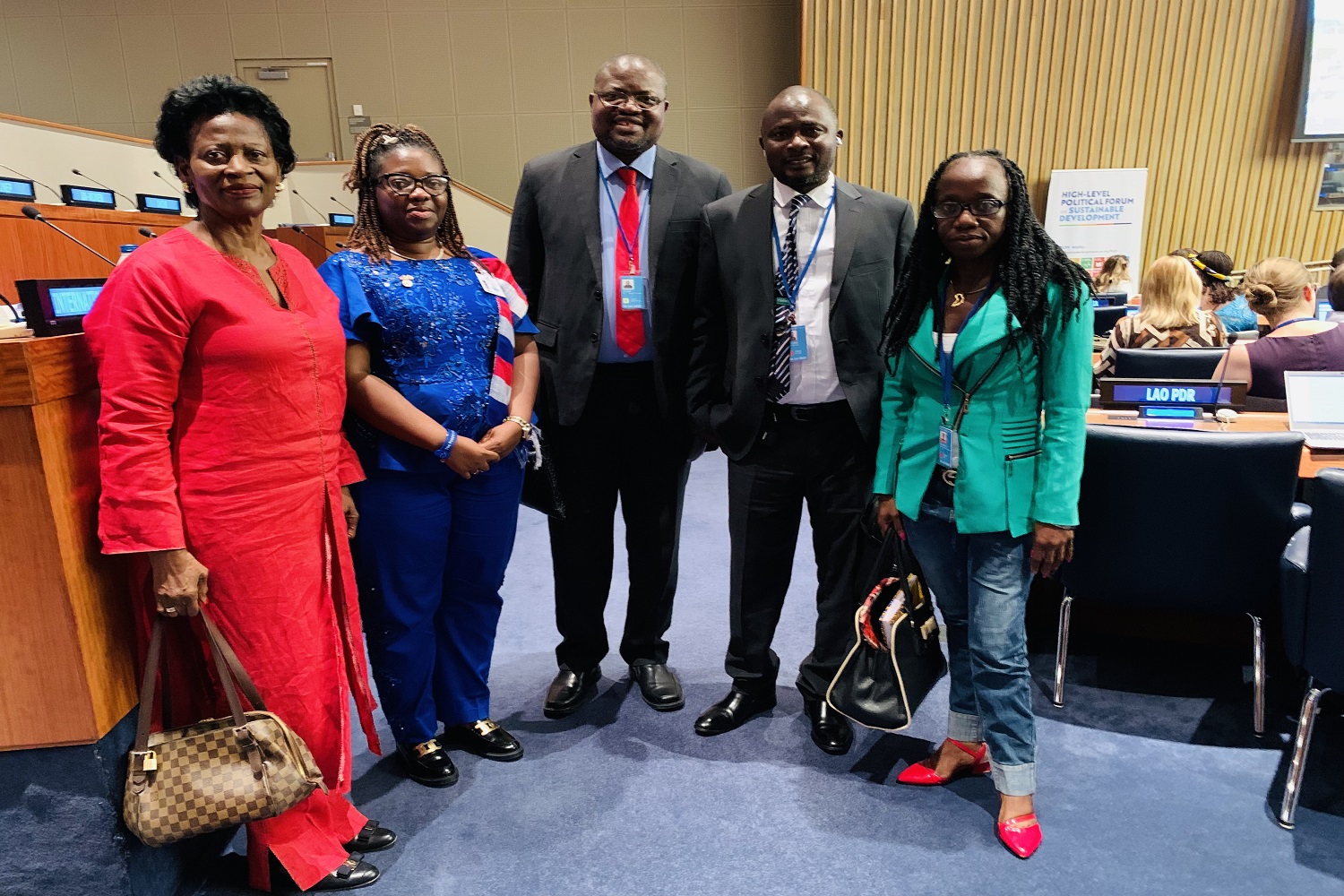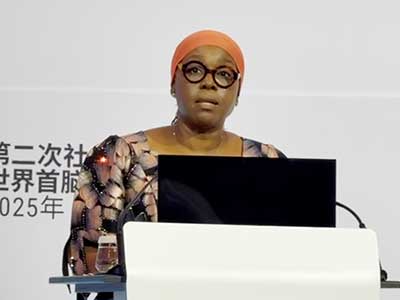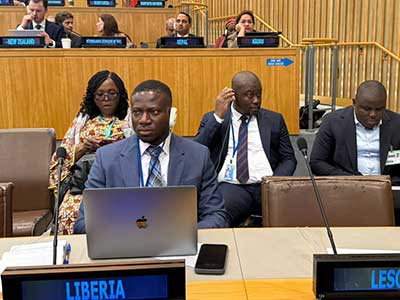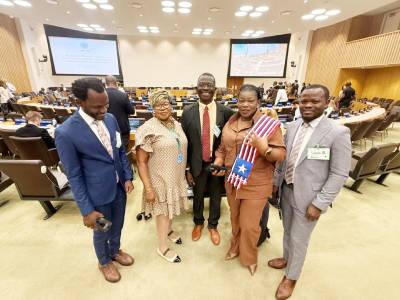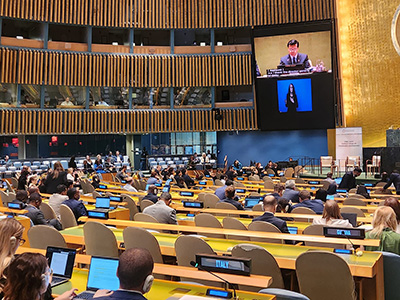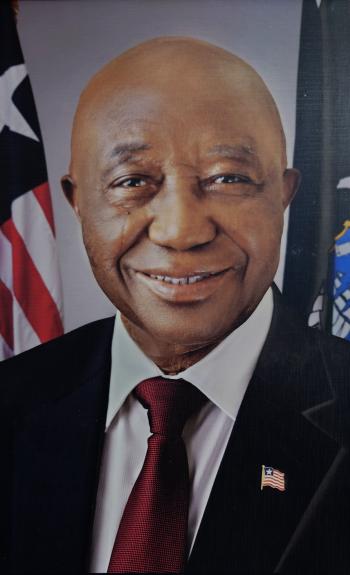The Government of the Republic of Liberia on Friday, July 15, 2022, presented to the United Nations its second Voluntary National Review (VNR) of the implementation of the Sustainable Development Goals (SDGs).
The Voluntary National Review is a process through which countries assess and present national progress made in implementing the 2030 Agenda--achieving the seventeen (17) Sustainable Development Goals and the pledge to leave no one behind.
Presenting the VNR, Deputy Minister for Economic Management at the Ministry of Finance and Development Planning, Hon. Augustus J. Flomo reported on the status of implementation of eleven of the seventeen SDGs which are priorities for Liberia, including Goals 1(No Poverty), 2 (Zero Hunger), 3 (Good Health and Wellbeing), 4 (Quality Education), 5(Gender Equality) , 6 (Clean Water and sanitation), 9 (Industry, Innovation and Infrastructure), 13 (Climate Change), 15 (Life on Land), 16 (Peace, Justice and Strong Institutions) and 17 (Implementation Mechanisms and Partnership for Goals).
Minister Flomo reported that Liberia continues to make remarkable strides in implementing the SDGS, with notable progress recorded in ensuring good health and well-being, quality education, gender equality, access to clean water and sanitation, and improving industry innovation and infrastructure, amongst others.
Providing more details, Minister Flomo spoke of reduction in maternal mortality rates and the prevalence of malaria and tuberculosis; achieving gender parity in school enrollment at all levels of education, and increased passing rates in the regional West African exams; as well as increased access to improved water sources and toilets.
“Liberia has made remarkable strides in reducing maternal mortality ratio by 31 percent from 1,072 per 100,000 births in 2013 to 742 per 100,000 births in 2020. … Liberia increased passing rates in the regional West African exams from 38.8 percent in 2018 to 76.2 in 2020. The country also achieved gender parity in gross and net enrollment across all levels of education in 2020. …Liberia increased access to improved water sources from 68 percent in 2007 to 84 percent in 2019-2020. Additionally, the country increased access to improved toilet facilities from 28 percent in 2007 to 47 percent in 2020.” Minister Flomo expanded.
Liberia’s Voluntary National Review (VNR) also includes reports of progress on improving infrastructure development, especially roads, and notes that “sixty-seven percent of rural Liberians live in areas not more than 1.2 miles from all-weather roads”. The VNR further speaks of improved internet services and availability and an increase in users, as well as improved laws and policies on access to information and freedom of the press.
On Goal 17—Implementation Mechanisms and Partnership Goals, Deputy Minister Flomo says while Liberia continues to promote partnership as the means of mobilizing and maximizing the resources required to implement the SDGs, the Government has developed a successful Domestic Resource Mobilization Strategy. “Liberia has developed a Domestic Resource Mobilization Strategy aimed at funding the Pro-Poor agenda for Prosperity and Development (PAPD), achieving the Sustainable Development Goals (SDGs) and popping up national frontline defenses to meet external shocks and emergencies. In the last three periods FY 2019/20, 2020/21, July-December 2021, domestic revenue’s share of budget resources averaged almost 86 percent”.
Despite the progress, Liberia’s VNR acknowledges that a lot more needs to be done to fully achieve the SDGs by 2030 and identifies the challenges that need to be addressed, including entrenched inequalities in access to development opportunities and basic social services, wide-spread infrastructure deficits, and pervasive poverty, coupled with the COVID-19 crisis and Russia’s invasion of Ukraine, which has increased global economic pressures.
Deputy Minister Flomo assured that the Government of Liberia remains committed and will continue to work towards fully implementing the SDGs-- setting new targets in response to current realities, shifting opportunities, and reallocating resources as necessary.
The VNR process, according to Deputy Minister Flomo, was participatory, involving the private sector, academia, development partners, the United Nations, Government Institutions, Civil Society Organizations, women, youths, religious groups, and children.
Liberia was among forty-four United Nations Member States that presented Voluntary National Reviews during the High-level Segment of the High-Level Political Forum, which convened in New York under the auspices of the Economic and Social Council from July 11-15, 2022.
Liberia’s delegation to the High-Level Political Forum was headed by Deputy Minister for Economic Management at the Ministry of Finance and Development Planning, Hon. Augustus Flomo and included Hon. Wiliametta E. Saydee-Tarr, Minister of Gender, Children, and Social Protection, Assistant Minister for Development Planning, Benedict Kolubah, Amb. Dintowon Pay-Bayee, Chairperson/Executive Director of the National Commission on Disabilities, and Mr. Haven Yarl, Technical Staff at the Ministry of Finance and Development Planning.
As part of the events of the High-Level Political Forum, Minister Flomo also addressed the Ministerial Roundtable discussions on Thursday, July 14, 2022, on the theme “Accelerating Achievement of the SDGs by 2030: Addressing ongoing crises and overcoming challenges”.
Minister Flomo, amongst others, called on the forum to identify the socio-economic and environmental impacts of the COVID-19 pandemic and Russia’s invasion of Ukraine and how the United Nations can help countries to respond. He also called on the United Nations to design and provide urgent support for import-dependent countries to keep development initiatives ongoing while addressing challenges brought on by both crises.
On the margins of the HLPF, the Liberian delegation participated in ‘Africa Day at the HLPF’, organized by the African Union in collaboration with the United Nations Economic Commission for Africa (ECA), the United Nations Development Programme (UNDP), and the African Institute for Economic Development and Planning (IDEP). The delegation also participated in side-events organized by the African Peer Review Mechanism (APRM), Ghana, and other organizations, and held several bilateral meetings, including meetings with the Ugandan and Bangladeshi delegations.
The High-Level Political Forum concluded with the adoption of a Ministerial Declaration, which focused on the theme of this year’s HLPF: “Building back better from the coronavirus disease (COVID-19) while advancing the full implementation of the 2030 Agenda for Sustainable Development”.

